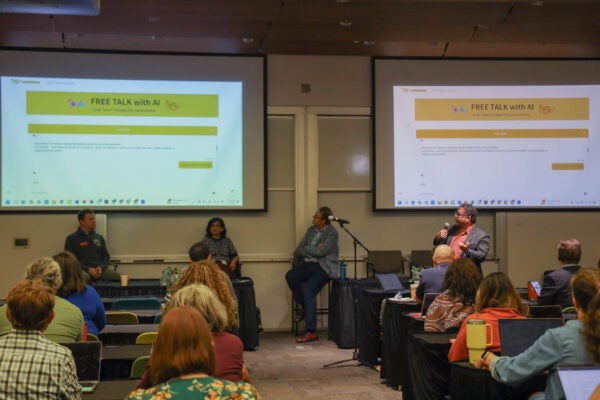As artificial intelligence tools become increasingly integrated into academic life, The University of Texas at Austin is leading the way with new guidelines to help students, faculty and staff use AI responsibly in educational settings.
The Responsible Adoption of AI Tools for Teaching and Learning framework, announced May 6 at a campus-wide convening co-hosted by the Office of Academic Technology and Good Systems, offers practical guidance on how to use AI ethically and effectively in support of teaching and learning. The proposed guidelines are open for public comment through July 31 and will be finalized in time for the fall semester.
“As AI tools become more common in academic settings, there’s an urgent need for practical guidance grounded in educational values like academic integrity, privacy and critical thinking,” said Kasey Ford, senior academic technology specialist and AI designer in the Office of Academic Technology. “We want to empower our community to use these tools confidently and responsibly.”
While many universities offer AI guidance, UT’s focus on teaching and learning makes it unique among major research institutions, said Julie Schell, assistant vice provost and director of the Office of Academic Technology. The framework builds on the University’s broader efforts to build an extensive technology infrastructure that fosters responsible innovation and provides the campus access to advanced AI tools while promoting ethical uses of AI across disciplines.
“At Good Systems, our goal is to build effective human-AI partnerships that benefit society,” said Ken Fleischmann, professor in the School of Information and founding chair of Good Systems. “Our research includes human-centered approaches to improving education and training, including smart hand tools for skilled trade workers, and we have also expanded education in ethical AI across campus.”
“There is a need to close the gap between technologists who need to learn how to consider the societal implications of their work and lawyers and policymakers who need to get up to speed on their understanding of AI,” said Sherri Greenberg, professor of practice in the LBJ School of Public Affairs and a past chair of Good Systems. “Our collaboration with the Office of Academic Technology reflects a shared commitment to ensuring that AI tools are not only pedagogically effective but also ethical, transparent and aligned with human values.”
The proposed guidelines reflect a collaborative, community-driven process. Over six months, a working group of faculty and staff members from across campus consulted with experts in pedagogy, AI research, data privacy and ethics to define what “responsible AI” means in the context of education. The resulting framework includes eight guiding principles to help make informed, values-based decisions about how and when to use AI tools.
The framework is intended to support anyone involved in the teaching and learning process, from instructors and students to instructional designers and academic staff.
“We didn’t want a top-down AI policy,” Schell said. “We wanted to build something that aligned with our campus values — something created by and for our community.”
The May 6 launch event featured panel discussions with UT faculty members, students and industry leaders exploring the shared responsibility of using AI to support learning, workforce readiness and University operations.
“As AI reshapes the way we live and work, institutions like UT Austin that are building an interdisciplinary framework for AI are essential in ensuring students are not only fluent in the technology but also in the values and responsibilities that come with it,” said Robin Lerner, senior director of academic engagement at Microsoft. “By integrating AI into its broader educational mission, the University is preparing students to lead with both innovation and trust.”
UT community members, including students, are encouraged to review the proposed guidelines and share feedback by July 31.
“The responsible adoption of AI in education should always serve learning,” Ford said. “By grounding these tools in core principles like feedback, critical thinking and academic integrity, we’re helping our community make smarter decisions — not just about technology, but about the future of education itself.”




